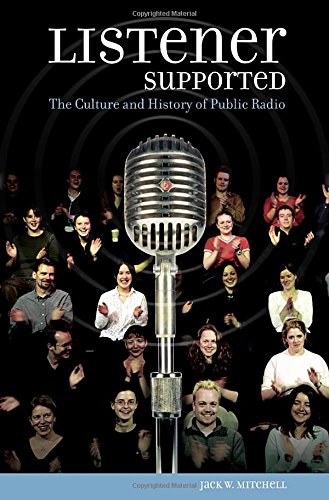 Reddit reviews Listener Supported: The Culture and History of Public Radio
Reddit reviews Listener Supported: The Culture and History of Public Radio
We found 2 Reddit comments about Listener Supported: The Culture and History of Public Radio. Here are the top ones, ranked by their Reddit score.

"Listener Supported: The Culture and History of Public Radio" by Jack Mitchell is your best bet. The author was involved in the founding of NPR. The book's scope goes beyond just NPR but I imagine should have what you want.
https://www.amazon.com/Listener-Supported-Culture-History-Public/dp/0275983528
You do have to consider the historical and organizational implications involved here, at a certain point.
There are many many many stations and public radio networks like those in Wisconsin that are lacking in local shows, and I would suggest listening to most of their programming before passing judgment. At many/most stations, the funding for solid local programming week to week is often just not there, and it takes significant amounts of funding to start and improve local programming, let alone increase an online presence.
That said, they're probably pretty lackluster, and that's unfortunately part of the norm. But you're coming with expectations set by one of the best, oldest, and well-established public radio systems in the country. Essentially, this is less of WI public radio being lacking and more of MPR excelling beyond the norm.
MPR is one of the oldest public radio and educational systems in country. It preceded NPR by organizing a really solid network of educational broadcasters. In 1973, MPR president Bill Kling pulled so much political weight within the public radio that he formed a rival group of public radio station managers that, in several ways, accused NPR of being to beholden to congressional lobbying for necessary funding. As a result, Kling took a seat on NPR's board of directors and started to use a heavy hand in the future of the company.
Kling also oversaw the development of A Prairie Home Companion, which was the first nationally syndicated public radio program to challenge NPR's dominance over public radio content.
This all kind of led up to the reversal of the public radio funding structure under NPR President Doug Bennet's administration. After major financial struggles and increased pressure from both congress and station managers, the US public radio system would no longer provide funds to NPR, which would in turn go to member stations. Instead, public funds from the Corporation for Public Broadcasting would go directly to stations, who could then, in turn, shop around different non-profit sources for public content. One of those sources would be MPR's American Public Media.
Today, MPR has the benefit of being one the larger providers of content via their parent organization, APM. So you actually have a middle-sized corporation running the show at MPR compared to, well, most of the country. Some states have established systems that work with all of the their stations to produced shared content, but only a handful have the capacity to syndicate content on such a large scale as MPR.
TL;DR: You went from the best of public radio to the sadly underfunded status quo of public radio.
Edited: Sources
Listener Supported by Jack Mitchell
NPR: The Trials and Triumphs of US Public Radio by Michael McCauley